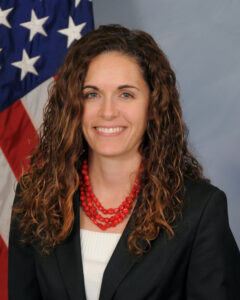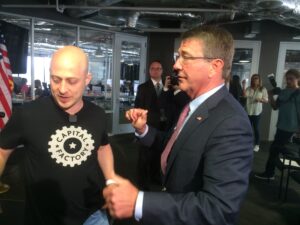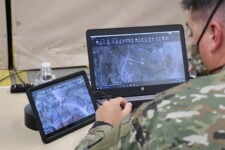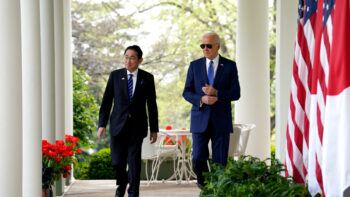
Logo of the Capital Factory in Austin, which will host the new DIU(X) presence.
UPDATED: Adds Carter & Kirchhoff remarks
AUSTIN: Today, Defense Secretary Ashton Carter will announce the latest location for his Defense Innovation Unit (Experimental) — but DIUX Austin will be organized differently from the home office in Silicon Valley or its offshoot in Boston.
Instead of its own offices, DIU(X) Austin will “occupy space within the well-known Austin technology incubator Capital Factory,” a Pentagon press release explained. It will be led by Christy Abizaid, a former Pentagon and NSC official, but it will largely be staffed by National Guard and Reserve troops who already live and work in Austin’s tech community, who’ll come in for short tours fulfilling their annual commitment of 39 days of service. (That’s the famous “one weekend a month, two weeks a year” of training). The reservists will report to Navy Reserve Commander Doug Beck, who’s head of DIU(X)’s in-house reserve unit, a decorated veteran of Iraq and Afghanistan, and a VP at Apple.

Christine Abizaid
“DIUx will build its ranks by recruiting proven local innovators who already serve our country in the National Guard and Reserves,” Carter said. “Once they come on board, they’ll serve part-time – that is, in their regular reserve capacity (i.e. instead of being mobilized and put on active duty). And if this model continues to succeed, we’re going to look to replicate it in other innovation hubs around the country.”
“I want them all to feel connected to us,” Carter added to reporters after.
The first reservist at DIU(X) Austin is Air National Guard 1st Lieutenant Samantha Snabes, an intelligence officer and co-founder of a 3D printing firm. “Lt. Snabes, who has also worked at NASA and with DARPA, is a great example of the innovative people we already have within our military’s ranks,” Carter said.
Part-time personnel rotating through someone else’s office space may seem a shoestring presence compared to the DIU(X) outposts in Palo Alto and Boston — but that’s probably the point. The idea of DIU(X) is to embed Defense Department representatives in hotspots of high-tech innovation, but there are many such hubs across the country. Putting a full-up office everywhere Americans were innovating would cost a lot of money and potentially create a new Pentagon bureaucracy, the last thing Secretary Carter wants. Piggybacking on office space and talent already in place should make it easier and cheaper to sprinkle DIU(X) outposts around the country.
“It obviously would be difficult for us to open up large offices in every innovation hub around the country,” DIU(X) co-managing director Chris Kirchhoff told reporters, “but we’re really lucky as a military to have an incredibly strong set of talented people in our Guard and Reserve…. We are looking at this Reserve and Guard model as the best way to scale to future outposts in other innovation hubs.”
“In all likelihood, we will open additional branches,” Carter told reporters, “but remember that each DIU(X) branch is itself a nationwide network, because that’s the way the tech community operates. (For example), the Austin technology community’s connected nationwide, in fact worldwide. So I’m not expecting the Austin hub to work only with innovators in Austin.”
With mostly part-time personnel working out of someone else’s offices, I asked, isn’t this a “DIU(X) Lite” approach?
“It’s not ‘lite’…but it is tailored to the strengths of this area,'” Carter replied. “All of our DIU(X) outposts will be tailored to the region they’re in.”
“It makes sense to start with the Guard and Reserve in Austin because there are so many Guard and Reserve (here),” Carter said, “such a rich combination already of people who have some military knowledge and experience and some technology experience.”
As for the location, “Capital Factory will be our home, at least initially, and we’re very grateful,” Carter said. “It makes perfect sense because there are lot of innovators here already (and) it’s exactly where we want to be, right at the center of things and in the mix….There’s no need to go outside of the Capital Factory that we’re in, for now. These things are going to grow, so we’ll see how it goes.”

Capital Factory executive director Joshua Baer talks with Defense Secretary Ash Carter at the roll-out of DIU(X) Austin.
At the very least, the new model helps put the Experimental in DIU(X). Carter has already overhauled the flagship office in Silicon Valley, replacing its leadership and streamlining its structure. The new incarnation, led by a local techie with military experience rather than a career civil servant, has invented a new contracting model, the Commercial Solutions Opening (CSO), and upped the pace at which it gave out funds.
“To date, DIUx has signed five agreements for $3.5 (million),” said the Pentagon press release. “Another 22 projects are in the pipeline, totaling an additional $65M of forthcoming investment.” DIU(X) works with established Defense Department organizations that are interested in ultimately buying a particular technology and which provide matching funds. So of the $68.5 million total, just $17 million is DIU(X)’s own money, while the other $51 million comes from the services and other parts of the Department.
So while DIU(X) writes checks, like many other Pentagon entities, its unique value is that it can find funding fast. “It took an average of just over 50 days after they first interacted with a company to award these funds,” Carter. “That’s fast, especially for the Department of Defense.”
‘The bad day’: DISA’s forthcoming strategy prepares for wartime coms
“It’s great to have internet day to day in peacetime,” said Lt. Gen. Robert Skinner, director of the Defense Information Systems Agency, “but it’s more imperative to have it when bullets are flying.”


























